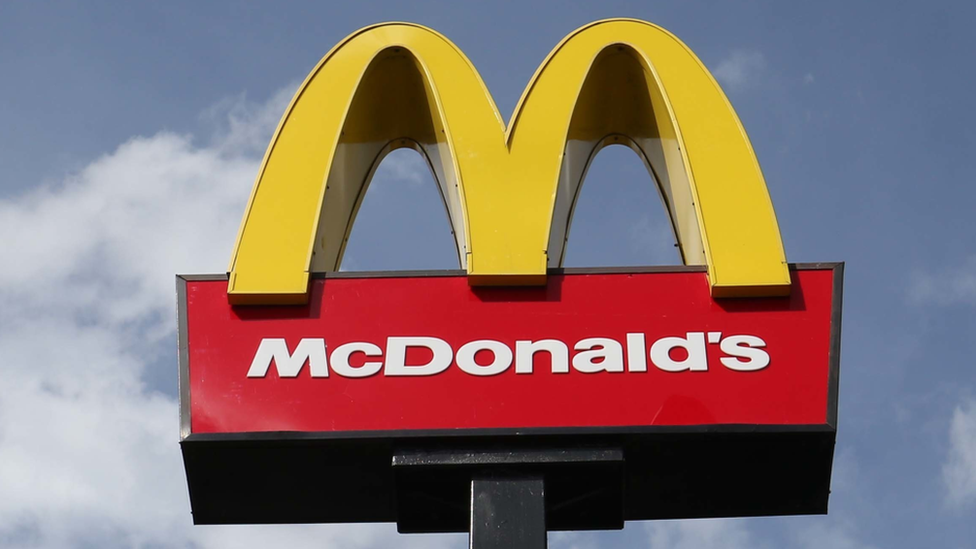McDonald's abuse claims personally shocking, says UK boss
- Published

McDonald's has launched a new investigation handling unit after the BBC reported on dozens of abuse allegations at the fast-food chain.
Alistair Macrow, chief executive of McDonald's UK and Ireland, said the claims he had heard this week are "personally and professionally shocking".
He apologised to anyone affected.
However, current and former workers that the BBC has spoken to said it's "too little too late".
"How can he be shocked? How can you be CEO of a company and not know this is going on?" asked Warren, who says he was sexually harassed by his manager at a Hampshire restaurant when he was 16.
"He's either out of touch with reality or he's just saying this now because they've had this negative publicity."
Emily, who says she was groped by her manager at a branch in the North West when she was 17, said she was sceptical about whether the new unit would make any difference.
"We've been let down time and time again," she said. "I'm glad they're trying a new system but I'm not sure it's going to be any more effective than what they've already tried to do."
A BBC investigation was told workers, some of them teenagers in their first jobs, are being groped and harassed almost routinely.
Mr Macrow said: "The unit will have oversight on all cases and the power to refer the most serious cases to a third-party legal team staffed by specialist investigators.
"The unit will be run by human resource and legal professionals full-time until at least the end of this year."
More than 100 current and recent staff at UK outlets of McDonald's alleged that they worked in a toxic culture of sexual assault, harassment, racism and bullying.
Since the BBC's report was published on Tuesday, more stories have surfaced, putting further pressure on McDonald's.
As well as setting up the investigations unit, McDonald's is appointing external experts to independently examine how workers' claims are "escalated". This can mean looking at when and how complaints are passed to other departments or more senior managers.
Many workers have alleged that their complaints were not escalated in an appropriate and timely way.
Mr Macrow said he wanted to ensure people had the confidence to speak out.
"It is crucial that people feel safe and able to speak up," he said. "Clearly this has not been the case in some parts of our business."
Mr Macrow added: "Any substantiated breaches of our code of conduct will be met with the most severe measures up to, and including, dismissal."
Mr Macrow said the company had "clearly fallen short" in some key areas.
"I am determined to root out any behaviour or conduct that falls below the high standards of respect, safety and inclusion we demand of everyone at McDonald's," he added.
Meanwhile, MPs have written to Mr Macrow demanding answers in the wake of the BBC's probe.
Darren Jones, chair of the Business and Trade Committee, asked him what action the company takes to ensure that franchises comply with UK labour laws.
Most workers are not directly employed by McDonald's because the company uses a franchise system. This means that individual operators are licensed to run the restaurants and employ the staff.
Mr Jones also asked what processes are in place for McDonald's workers in the UK to raise complaints.
McDonald's has until 11 August to respond to the letter.
The fast-food chain is one of the biggest private sector employers in the UK. It has more than 170,000 people working in 1,450 restaurants.
Mr Macrow also said he would assemble a panel of restaurant workers as an advisory group "to help embed 'speak up' confidence throughout our business with special regard for our tens of thousands of younger employees".
Some of the names in this story have been changed to protect people's identities.

Have you been affected by issues covered in this story? You can share your experiences by emailing haveyoursay@bbc.co.uk, external.
Please include a contact number if you are willing to speak to a BBC journalist. You can also get in touch in the following ways:
WhatsApp: +44 7756 165803
Tweet: @BBC_HaveYourSay, external
Please read our terms & conditions and privacy policy
If you are reading this page and can't see the form you will need to visit the mobile version of the BBC website to submit your question or comment or you can email us at HaveYourSay@bbc.co.uk, external. Please include your name, age and location with any submission.